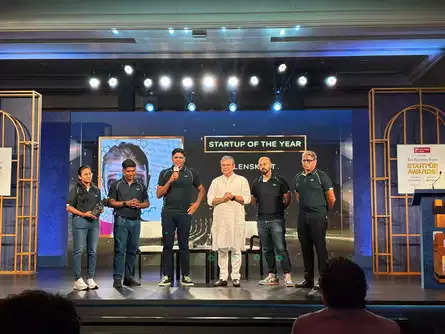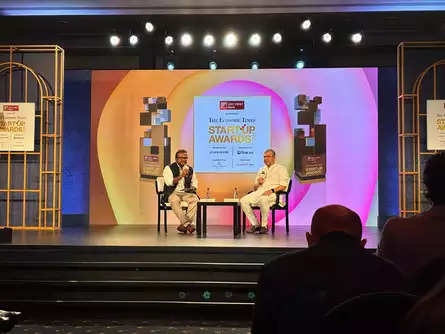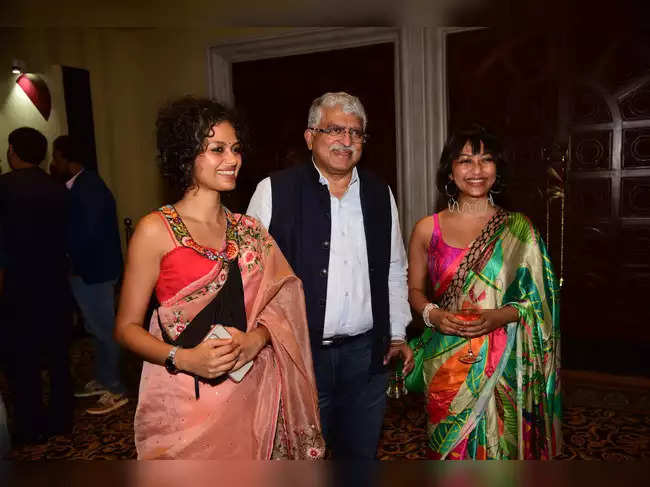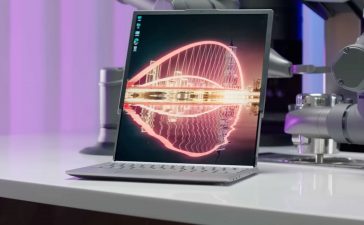The gathering of over 250 eminent personalities discussed several hot-button issues on the sidelines of the summit, which featured a chat with guest of honour Union minister Ashwini Vaishnaw and a panel discussion hosted by Infosys chairman and cofounder Nandan Nilekani.
In this special newsletter, we bring you a roundup of all that happened at India’s most prestigious awards for entrepreneurship.
ET Startup Awards 2024: Ten years on, Startup Inc’s raring to rev it up to 110%

(L-R) Satyan Gajwani of Times Internet, Aniket Doegar of Haqdarshak, Hardika Shah of Kinara Capital, Geetansh Bamania of Rentomojo, Mukul Arora of Elevation Capital, jury chair Nandan Nilekani of Infosys, union minister Ashwini Vaishnaw, Khet Singh Rajpurohit of ClaimBuddy, Rimjhim Agrawal of BrainSightAI, Peyush Bansal of Lenskart, Laina Emmanuel of BrainSightAI and Varun Gupta of Boult
India’s real ‘techade’ is beginning now, with the crackling internet ecosystem expecting substantial growth in the coming decade — this was the resounding theme at the 10th edition of The Economic Times Startup Awards.
Guests of Honour: The star-studded ceremony had Union minister Ashwini Vaishnaw as the chief guest

Ashwini Vaishnaw, railways, information & broadcasting and electronics & IT
Also in attendance were Kalyan Krishnamurthy, chief executive of the Flipkart group; Lalit Keshre, founder and chief executive of Groww; Meesho cofounder and CEO Vidit Aatrey; Hari Menon, cofounder and CEO, BigBasket; GV Ravishankar, managing director at Peak XV Partners and other founders and investors from across the spectrum.

Winners: Lenskart received the coveted Startup of the Year award, joining a list of illustrious winners that include Razorpay, Zomato, Zerodha, Delhivery, Swiggy, OfBusiness, Freshworks, Oyo Hotels & Homes and Ola.
The buzz word: The big discussion in this year’s ETSA was building big companies. Nilekani said India has not been able to create companies of the scale of Uber or Airbnb yet, but the next decade may see founders strive for that.
“The country will compound at 6% or 7% for the next many years and that will open up a huge opportunity for tech-first companies,” Groww’s Keshre said.
Also Read | ET Startup Awards 2024: Founders, investors hail ‘best startup congregation’
ETSA 2024: The first decade was just a warm-up, the real game starts now

L-R: Nandan Nilekani, Infosys cofounder, Peyush Bansal, cofounder, Subrata Mitra, partner at Accel and Aadit Palicha, cofounder, Zepto
At the ET Startup Awards, Infosys chairman Nandan Nilekani hosted a panel discussion to analyse a decade of the Indian startup industry and what’s coming in the next 10 years. Lenskart cofounder Peyush Bansal, Zepto cofounder Aadit Palicha, and Accel’s Subrata Mitra said during the chat that the first decade was a warm-up act, and real scale-up is yet to come.
Growing ecosystem: “Startups beget startups,” Nilekani remarked. He said startups are building on top of the technology stack with the help of the Digital Public Infrastructure (DPI). He also pointed out how large tech companies and traditional conglomerates have spawned new startups.
Bansal said the first decade for Indian startups was only about tangibles, growth valuation, and such. But now founders are looking at the intangibles as well.
Corporate governance: One point that came up in the discussion moderated by Nilekani was the recent issues of corporate governance faced by many new-generation companies over the last two years. Responding to his question on how much of the blame lies on venture investors, Subrata Mitra, partner at Accel, one of the most prolific startup backers, said investors cannot take the entire blame; everybody has a part to play.
Zomato’s top ranks needed a spring clean after IPO highs: cofounder & CEO Deepinder Goyal

Zomato CEO Deepinder Goyal and ETtech editor Samidha Sharma
Zomato cofounder and CEO Deepinder Goyal detailed the food and delivery company’s journey from listing at $7.6 billion to hitting a $29 billion market cap in a fireside chat with ETtech editor Samidha Sharma at the Economic Times Startup Awards (ETSA). Edited excerpts:
Post-IPO Zomato: The IPO was good, business was doing well, and people made lots of money for the first time in their lives. These were competent people. Competent people can’t recognise that they are actually being complacent… They don’t seek progress anymore; they just start filling in the time. That’s what we had come down to. There was no work happening inside the organisation for a while. I had to clear out pretty much everybody who had lost that drive and then reboot the organisation.
Q-commerce rise: The growth of quick commerce has been a surprise for us as well. What we have noticed is that Blinkit is not really eating into the kiranas; it is not even affecting companies like Dmart. We are more or less eating into Amazon and Flipkart’s shares as well as the modern retail space in the larger cities.
Word to the IPO-bound: Our timing of the IPO, in hindsight, was great, but we didn’t time the IPO. We started the IPO process when the market was at its lowest point. So, first of all, companies should not think of timing the IPO well. They should think of an IPO as part of a long-term journey and do it whenever they are ready for it.
Watch the full interaction here
Chips to AI… India’s moving up the digital value chain: Ashwini Vaishnaw

Union minister Ashwini Vaishnaw and ET editor Sruthijith KK
In a fireside chat at ETSA, Union minister for railways, information and broadcasting, IT and electronic Ashwini Vaishnaw spoke to Sruthijith KK about the evolution of India as the next big semiconductor destination, its growing talent pool as well as the government’s approach to artificial intelligence. Edited excerpts:
Semicon play: In the semiconductor mission, we have approved about 25-odd applications for design of chips and chipsets and SoC (system on a chip). Out of that, 13 have done so well. And three of them have actually started attracting venture capital.
The Micron facility will start shipping early 2025. The first made-in-India memory chips will be available.
Getting to $1-trillion economy: Part of that will be from the existing IT services ramping up, electronics manufacturing and having more use cases for our DPI (digital public infrastructure). All these combined will make the $1 trillion digital economy.
Manufacturing on the rise: The minister said that the quantum of manufacturing in the country is today worth $120 billion. “We have identified about eight sub-modules where we can have large-scale production, and the programme is in the process of being finalised. All the stakeholders are being consulted,” he said.
Also Read | India is going to be the next big semiconductor destination: Ashwini Vaishnaw.
Going global is the refrain at Met Gala of startup calendar

Nandan Nilekani, cofounder, Infosys, Sujata Biswas (left) & Taniya Biswas, founders, Suta
One thing became clear on the rainy Saturday in Bengaluru; this edition of The ET Startup Awards was the most rocking one yet.
Passing the baton: The ETSA 2024 was the passing out parade for a generation of startup entrepreneurs, with the next gen – duly clad in their t-shirts and sneakers – ready to take over the disruptor tag.
Going global: With a whole pride of startups at the cusp of introduction to the public markets or already listed, conversations weren’t so much about the next round of funding and the quantum of runway left, but about the execution needed to go global.
“We need to change the orbit we’re operating in. We have to change our equation in terms of creating impact globally, like Microsoft or Google. We are so awed by global brands…the same needs to happen to Indian brands globally,” Bansal said during the panel discussion with Nilekani.










